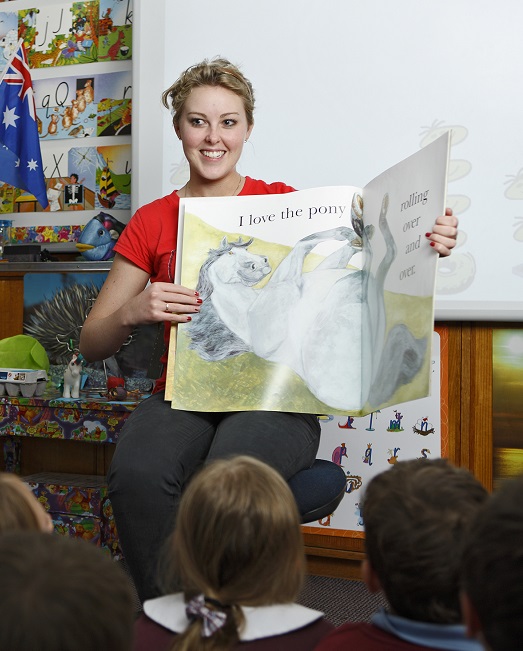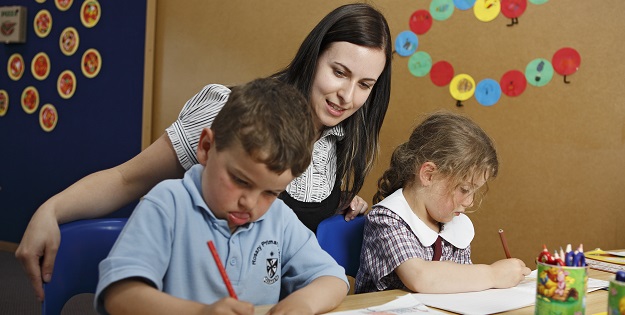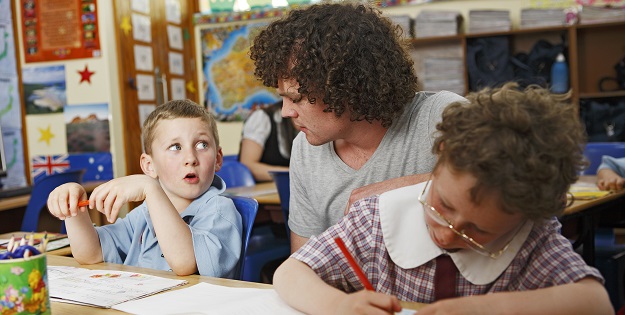Global
Copyright@ Australian Catholic University 1998-2026 | ABN 15 050 192 660 CRICOS registered provider: 00004G | PRV12008
Copyright@ Australian Catholic University 1998-2026 | ABN 15 050 192 660 CRICOS registered provider: 00004G | PRV12008

When Rauno Parrila, Director of the Australian Centre for the Advancement of Literacy, was a four-year-old in Finland, his teenage aunt taught him how to read. Before he had even started school, he was sounding out words, building his vocabulary and making sense of simple stories. And yet, Professor Parrila is quick to point out that “with Finnish, that’s not such a big task”.
In the Finnish language, or suo̯mi, the relationship between sounds (phonemes) and letters or letter combinations (graphemes) is largely consistent, making it relatively easy to decode. Compare that to English, where the link between the sound and spelling of words can be complex and chaotic: take, for example, rough, dough, plough, cough, through and thorough, all of which end in ‘ough’ but are pronounced differently.
“In English, you probably need to learn more than 200 grapheme-phoneme correspondences, and you also need to learn that some letter combinations are pronounced differently in different words,” says Professor Parrila, who joined ACU in 2023, when the Australian Centre for the Advancement of Literacy was launched.
“That takes much longer to learn because it’s a kind of probabilistic relationship where there’s potential for confusion, and so kids often have persistent accuracy problems that you don’t see as much in other languages.”
Early in his research career, Rauno Parrila was drawn to these complexities: how the quirks of the English language can make it difficult to learn. After completing his PhD at the University of Alberta in 1996 with specialisation in learning and development, he turned his focus to reading and literacy, exploring word reading problems like dyslexia.
These were the days of the so-called reading wars, where advocates for two distinct methods of teaching children to read – the phonics-based approach and the ‘whole language’ approach – were locked in a battle over which method worked best.
“There was a real need for the scientific study of reading, because teaching practices in schools at the time were very heavily philosophically-oriented rather than research-oriented,” says Professor Parrila, who is a strong advocate for evidence-backed approaches to reading instruction.
“I thought that if I could combine my developmental psychology training with the educational psychology training, I could make a contribution in the area.”
Some three decades later, Professor Parrila is one of Australia’s most experienced and influential scholars in literacy education. And while he’s still active in research, with recent contributions including studies on the links between dyslexia and mental health, and the connection between teachers’ language knowledge and student outcomes, his priorities have shifted since joining the Australian Centre for the Advancement of Literacy as its inaugural director.

“The experts at our research centre are hand-picked, and they are the leading minds in this area who will undoubtedly produce research of the highest quality,” he says. “My main focus is to ensure that the evidence gathered through that research is translated to teachers, schools and parents in a manner they can understand, so that it has real-world benefits to children as they learn to read and write.”
The centre will advance students’ literacy with a triangulated approach, Professor Parrila adds, combining cutting-edge research with enhanced teacher education programs and a new not-for-profit literacy clinic.
“Our vision is that every student leaving school has the literacy skills they need to pursue their dreams, whether they want to be a writer or a tradesperson or anything in between,” he says. “I see no reason why we can’t achieve that, and I see no reason at all why Australia couldn’t be the most literate English-speaking country in the world.”
In recent years, much has been said and written about Australia’s declining reading scores in the OECD’s Programme for International Student Assessment (PISA), which evaluates how well 15-year-olds have mastered key academic subjects.
The PISA scores are seen as important for two main reasons: firstly, the test assesses how students apply the things they’ve learned at school in the context of real-world problems and situations; and secondly, the results tell us how our students are performing against the rest of the world.
In the latest results, Australian students scored higher than the OECD average in reading; however, if you look at test scores over the past two decades, our performance in reading has been in steady decline since 2000, when the data was first collected.
Recent national assessments have also caused alarm, showing that around one in three secondary school students are struggling with reading.
“Literacy issues in high schools quickly become productivity issues in terms of economic output, because of the strong links between literacy and life success,” says Professor Parrila, who notes that children and adolescents who struggle to read tend to face lifelong disadvantage.
Declining literacy is also a huge cost to the Australian economy, he adds.
“If the price of literacy in Australia is about the same as it is in the UK and Canada, just raising the literacy level by one or two points in the international comparisons would add $60 billion a year to the nation’s GDP. It’s not just an issue for individuals; it’s a business issue.”
Large-scale studies exploring secondary school reading attainment are among the centre’s key research priorities, with one of its star recruits, the current ARC Laureate Fellow Professor Anne Castles, investigating how teaching practices and strategies could be improved for students who need greater literacy support.
“Historically speaking, secondary school reading has been really neglected in research, and that’s why it’s such a big part of our vision,” says Professor Parrila, who previously worked closely with Professor Castles at Macquarie University.
Alongside that work, the centre’s other high-profile experts will investigate reading difficulties in younger students, including Professor Genevieve McArthur, whose research explores the relationship between poor reading and anxiety in early learners.
Says Professor Parrila: “We’ve got some very skilled researchers looking at reading difficulties and disabilities in younger children, and we know that phonics is an essential foundation in the early stages of learning to read – but the question remains: how can we make it better?”
Which brings us back to the reading wars, the decades-long debate around how children should be taught to read.
According to many experts, decades of disagreement on this issue, along with a lack of clear government policies on educational strategy, are key causes of the problems we’re currently seeing in reading attainment.

While whole-language has long been the predominant teaching approach in Australia, the weight of evidence supporting explicit phonics-based instruction has led some to declare the war is over.
And yet, there are holdouts. As Professor Anne Castles and her co-authors noted in the oft-cited study, ‘Ending the Reading Wars’, research has provided answers on how best to teach children to read, “but, somewhat surprisingly, this research has been slow to make inroads into educational policy and practice”.
So, is the persistence of teaching methods based on philosophy, rather than scientific evidence, the main cause of the decline in reading attainment in Australia?
“I think the issue of how children have been taught to read is a big reason,” says Professor Parrila, “but as to whether it’s the main reason, that’s a difficult question to answer.”
He points out that reading practice is declining in many parts of the world, and that there are “a whole lot more children who don’t read books than there ever used to be”. Instead, they consume content on social media platforms, where the text is shorter and of lower linguistic quality.
“That kind of reading doesn’t develop your reading skills in the same way as reading books, and that makes this partly a cultural issue,” he says.
Professor Parrila notes, however, that fears over so-called ‘digi kids’, who are so distracted by digital technology that they don’t develop the reading skills of previous generations, are not currently supported by evidence.
“We have to be careful what we say about digital devices because we simply don’t know what impact they might be having on the development of literacy skills,” he says. “It’s relatively well established that access to devices should be limited to some extent, but we don’t have the weight of evidence to say that screens are harming this generation’s ability to learn to read.”
He also says that while English might be a tricky language to learn, reading difficulties exist in all languages he has studied through research: Greek, French, Mandarin, Japanese, Sinhala and even Finnish.
“Reading difficulties are not unique to English-speaking nations – they’re universal,” says Professor Parrila, adding that functional illiteracy is one of the world’s greatest social challenges.
“Teaching reading to students who struggle can be an extremely complex task. But if we use the right teaching practices, and if we focus on the strategies that are backed by evidence, there is no question that almost every Australian child can learn to read to a level that allows them to pursue their dreams.”
Professor Rauno Parrila’s research focuses on psychological, linguistic, and social correlates of typical and atypical development of reading and academic achievement. He has also been named as the Australia’s Research Field Leader in Early Childhood Education and in Special Education.

Copyright@ Australian Catholic University 1998-2026 | ABN 15 050 192 660 CRICOS registered provider: 00004G | PRV12008